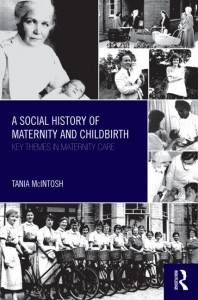MODERN mothers-to-be in Nottinghamshire might debate the merits of a home birth versus a hospital delivery, but for their grandmothers or great-grandmothers, the choice simply didn’t exist.
A new exhibition, Mothers And Midwives: A History Of Maternity in the East Midlands, at Lakeside Arts Centre, looks at the reasons for this dramatic change, and the impact it has had on women, families, midwives and communities in the region.
The FREE exhibition runs from 13 January to 15 April with lunchtime talks in January, February and March to amplify themes explored in the display.
The experience of having a baby has changed dramatically over the last hundred years. It has moved from a social and domestic occurrence, attended by a sole neighbourhood midwife, to a more medicalised one which predominantly occurs in hospital. Midwives still deliver about 70% of all babies born and are usually the only professional in attendance.
The exhibition explores the development through historical and contemporary sources, covering issues surrounding pregnancy, birth, and the early weeks of caring for an infant. There are historic midwifery records, photographs, and equipment relating to midwifery and baby care. Historic material from the Manuscripts and Special Collections at the University of Nottingham provides extracts from published sources as well as letters and diaries on the subject, and reveals illuminating archives of medical understanding and accepted practice from earlier times.
A series of talks throughout the exhibition will draw on the firsthand experiences of those who have delivered babies in a very different era, as well as offer insights from historical experts.
Shona Powell, director of Lakeside, said: ‘This fascinating exhibition traces the evolution of our experiences of giving birth in the 20th and 21st centuries. The customs and decisions around how we bring babies into the world is such a lively topic for debate in every generation. It’s so interesting to see how we’ve moved from putting this momentous event in the hands of someone familiar to us in our home, to a risk-averse attitude where we have the advantages and interventions of modern medicine – but it can become more depersonalised. I think younger visitors will be amazed at how much has changed in such a short space of time. The exhibition will be a must-see for parents and anyone with an interest in our local social history.’
Dr Tania McIntosh, a lecturer in midwifery at the University of Nottingham who has worked with Manuscripts and Special Collections to develop the exhibition, explained: ‘Pregnancy and birth are universal experiences and this exhibition taps into that by showcasing the many different types of evidence which can help to tell the story of birth through the ages. It is also important to collect material relating to very domestic issues such as birth; they are as important to our understanding of society as wars or revolutions. If you are inspired by the exhibition to search your cupboards or attics for family photos or papers about birth, or have your own story to tell, then we would be very interested in hearing from you.’
The lunchtime talks will be:
Infant Welfare
Wednesday January 18
Dr Denise Amos, researcher for the Nottinghamshire Heritage Gateway and co-curator of ‘Mothers and Midwives’ examines the patterns and causes for the significant number of infant deaths at the end of the 19th and beginning of the 20th century in three East Midlands towns: Nottingham, Leicester and Derby.
From Home To Hospital
Wednesday February 15
Using contemporary records, pictures and interviews, Dr Tania McIntosh, principal curator of ‘Mothers And Midwives,’ explores the changing experience of birth in the 20th century and the reasons why it became a medical rather than domestic event.
Midwifery In the District
Wednesday March 14
Julia Allison, former district midwife in Nottingham, past-President of the Royal College of Midwives and author of ‘Delivered At Home’, a history of district midwifery in Nottingham, will talk about the development of district midwifery and the experience of having a baby ‘on the district’.
Places for the talks are limited, so please book your tickets as soon as possible with the Box Office on 0115 8467777.
The exhibition runs from now until Sunday 15 April and is free to visit. It is open from 11 am-4 pm Monday to Friday, and 12 noon-4 pm Saturdays, Sundays and Bank Holidays (but closed Easter Sunday). It is at the Weston Gallery, DH Lawrence Pavilion, University of Nottingham.
 Published 5th March 2012 by Routledge – 188 pages
Published 5th March 2012 by Routledge – 188 pages
